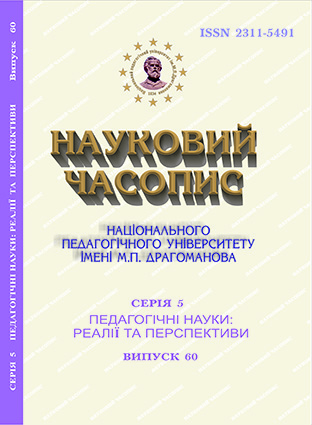TRANSFORMATIVE LEARNING STRATEGIES IN TEACHING ADULTS FOREIGN LANGUAGES
Ключові слова:
transformative learning, heutagogy, personalization, teaching adults, continuing educationАнотація
The article is devoted to the theory of transformative learning in regard to teaching adults foreign languages and within the framework of continuing education under modern conditions. It is stated that transformative learning theory considers the process of “perspective transformation” as having three dimensions: psychological (changes in understanding of the self), convictional (revision of belief systems), and behavioral (changes in lifestyle). Transformative learning refers to those learning experiences that cause a shift in an individual’s perspective. The main concepts and strategies of transformative learning are discussed; the notions of heutagogy and personalization are outlined. It was found that heutagogy is most commonly understood as the strategy of self-determined learning, while personalization in the context of transformative learning is seen as applying different approaches to different learners depending on their strengths and interests while achieving a common goal. The conditions of cognitive perspective transformation are described. The ways of fostering transformative learning, such as relationships, critical reflection, direct and active experience, discourse, and their possible implementation in teaching adults foreign languages are proposed including specific techniques and methods. The article considers the roles of educator, which is considered as a “delicate mediator”, and student as a socially active critical agent of the learning process and the essence of knowledge and its achievement from the point of view of transformative learning. It is argued that knowledge is in deep connections with social, cultural, historical and psychological context; the learners achieve a self-developing system and are engaged in social and intellectual interaction.Посилання
Collard S., & Law M. The impact of critical social theory on adult education. Proceedings of 32nd Annual Adult Education Research Conference. Norman, 1991. – P. 56–63.
Henderson J. An Exploration of Transformative Learning in the Online Environment. 26th Annual Conference on Distance Learning and Teaching, 2010. Retreived from: http://www.uwex.edu/disted/conference/resource_library/ proceedings/284310.pdf.
Kenyon Chris and Stewart Hase. Moving from Andragogy to Heutagogy in Vocational Education. Research to Reality: Putting VET Research to Work. ERIC Document Reproduction Service № ED456279. 2001. Retrieved 1 March 2016 from http://www.lindenwood.edu/education/andragogy/andragogy/2011/Kenyon_2001.pdf.
Knowles M. The adult learner: A neglected species. Houston, TX: Gulf Publishing, 1984. – 245 p.
Mezirow J. A critical theory of adult learning and education. Adult Education, 1997. – P. 3–32.
Mezirow J. Fostering Critical Reflection in Adulthood. San Francisco: Jossey Bass, 1990. – 416 p.
Taylor E. An update of transformative learning theory: a critical review of the empirical research (1999–2005), International Journal of Lifelong Education, 2007. – P. 173–191.
Zhao, Yong. Outcome vs. Process: Different Incarnations of Personalization. Retrieved 1 March 2016 from http://zhaolearning. com/2015/07/20/outcome-versus-process-different-incarnations-ofpersonalization/.


